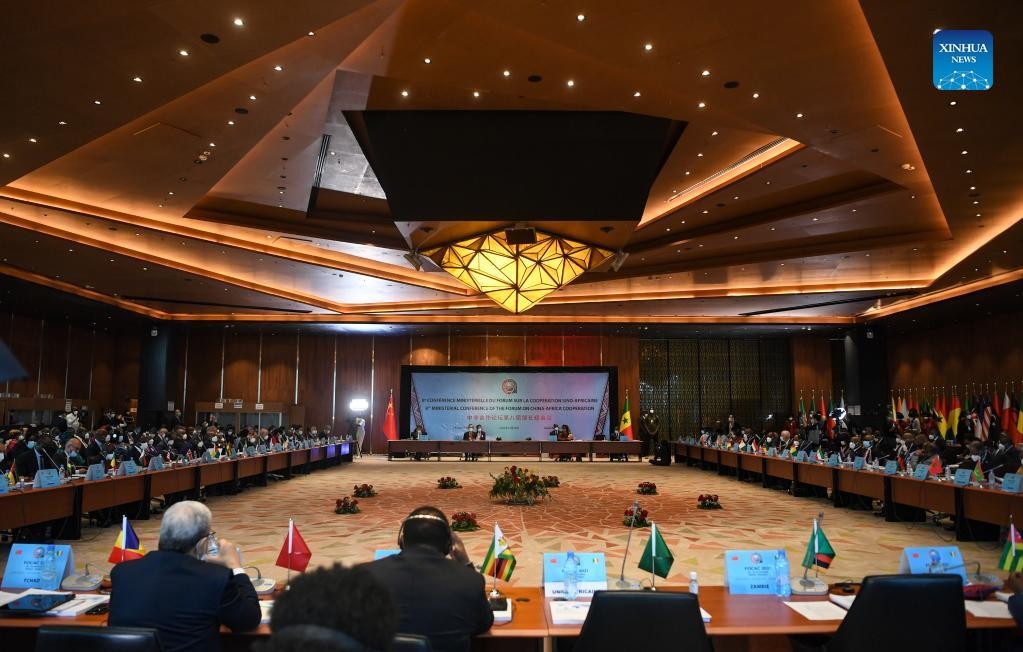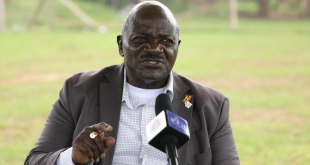
Photo shows the 8th Ministerial Conference of the Forum on China-Africa Cooperation (FOCAC) in Dakar, capital of Senegal, Nov. 30, 2021. The 8th Ministerial Conference of the FOCAC was held here from Nov. 29 to 30. (Xinhua/Li Yan)
The Eighth Ministerial Conference of the Forum on China-Africa Cooperation (FOCAC) held in Senegal has achieved a complete success, said Chinese State Councilor and Foreign Minister Wang Yi.
Despite the impact of the COVID-19 pandemic, China and Africa had overcome difficulties to hold the conference on schedule, carrying out pragmatic and efficient discussions on the theme of the conference and reaching broad consensus, Wang said.
The conference reviewed the achievements made in the development of China-Africa relations and China-Africa solidarity in fighting the pandemic since the Beijing Summit of FOCAC in 2018, deliberated the implementation of the “eight major initiatives” announced at the Beijing Summit, and passed an array of outcome documents, he said.
The conference, held in Dakar, Senegal on Nov. 29-30, was jointly presided over by Wang and Chinese Commerce Minister Wang Wentao, and Senegalese Foreign Minister Aissata Tall Sall and Senegalese Minister of Economy, Planning and Cooperation Amadou Hott.
The conference, with the number of outcome documents adopted surpassing all previous conferences, fully reflects the high quality and high level of the China-Africa cooperation, and demonstrates the two sides’ firm determination to seek common development, meet challenges and share the opportunities jointly in a new era, Wang said.
Wang said that the conference unanimously decided to continue to promote anti-epidemic cooperation. At the opening ceremony, Chinese President Xi Jinping announced that China would provide an additional 1 billion doses of COVID-19 vaccines to Africa, which received high praise and enthusiastic response from African leaders and colleagues, Wang said.
China will fully implement the solemn commitment made by President Xi, continue to support the exemption of vaccine intellectual property rights, help Africa improve its vaccine localization production capacity, bridge the “immunization gap” as soon as possible, and provide strong support for Africa’s anti-epidemic efforts, Wang said.
Wang said that the conference had in-depth discussions on major issues such as the international situation and global governance, and agreed to carry forward the true multilateralism, firmly safeguard the UN-centered international system and the international order based on international law, firmly safeguard the sovereignty, security, and development interests of China and Africa, and safeguard the common interests of developing countries.
Wang also said that the conference agreed to increase the representation and voice of developing countries, including African countries, in international arena, and jointly build a new type of international relations featuring mutual respect, equity and justice, and win-win cooperation.
The Chinese foreign minister emphasized that China-Africa cooperation has bucked the downwards trend and shown great resilience and potential, noting that both sides should take the opportunity of implementing the outcomes of the FOCAC forum to better benefit the Chinese and African people.
First, China and Africa should make great strides along the broad road of building a China-Africa community with a shared future in the new era, he said.
Both sides should firmly follow development paths in line with their own national conditions, deepen dialogue and exchanges in governing their countries, stay firm in holding their future and destiny in their own hands, and firmly support each other’s efforts to defend national sovereignty, security and development interests, Wang said.
Efforts should also be made in promoting in-depth strategic alignment of China-Africa joint construction of the Belt and Road and the Global Development Initiative with the African Union’s 2063 Agenda, the construction of the African Continental Free Trade Area, and the development strategies of African countries, he said.
Second, it is necessary to usher in a new era of upgrading and high-quality development of China-Africa cooperation, Wang said.
Both sides will continue to adhere to the FOCAC spirit of extensive consultations, joint contributions and shared benefits, work together to implement the “nine programs” and upgrade China-Africa cooperation in fields including medical and health care, improvement of people’s livelihood, green development, digital economy and capacity building, so as to make a greater contribution to Africa’s post-COVID-19 economic recovery and sustainable development, Wang said.
China has always been Africa’s most sincere and reliable cooperative partner, he said. China’s input in Africa will only increase, not weaken.
Third, it’s necessary to uphold traditional friendship and carry forward China-Africa friendship from generation to generation, Wang noted.
Both sides should carry forward the spirit of China-Africa friendship and cooperation, tell Africa’s stories well in China and tell China’s stories well in Africa, contributing to and safeguarding China-Africa friendship, he said.
The two sides will strengthen exchanges between young people and women, take an active role in caring for and protecting Chinese nationals and African expatriates on both sides, and cultivate more people who are familiar with China-Africa relations, love China-Africa cooperation and cherish China-Africa friendship, so that the flower of China-Africa friendship nurtured by the older generations will last forever, he added.
Fourth, it is necessary to safeguard true multilateralism and international fairness and justice, uphold the just propositions of China, Africa and other developing countries, and advance the international order toward a more just and reasonable direction, Wang said.
China stands ready to work with Africa to encourage more countries and international organizations to join the Global Development Initiative and the Initiative on Partnership for Africa’s Development, so as to create a stronger synergy for the international community in supporting Africa’s development, he stressed.
The 8th Ministerial Conference of the FOCAC was also attended by foreign ministers or representatives, as well as ministers of economy, trade and finance from 53 African countries.
All participants of the conference spoke highly of a series of new major measures for furthering China-Africa cooperation announced by President Xi and the fruitful results of Africa-China cooperation achieved under the framework of the FOCAC.
They said that China has become an indispensable partner in Africa’s development and the FOCAC has become the most important accelerator of Africa-China cooperation.
Africa countries support and will take an active part in the Global Development Initiative and the Initiative on Partnership for Africa’s Development, hope to get greater support from China in areas such as Africa’s industrialization and anti-pandemic efforts, and are willing to jointly build the Belt and Road with high quality to improve the well-being of the people and achieve common prosperity, they said.
The conference adopted four documents of the Dakar Declaration of the 8th Ministerial Conference of the FOCAC, the Dakar Action Plan (2022-2024), the China-Africa Declaration on Climate Change Cooperation, and the China-Africa Cooperation Vision 2035.
Wang and Aissata jointly met the press after the conference concluded.
During the conference, Chinese Commerce Minister Wang Wentao introduced the implementation of the eight major initiatives proposed at the 2018 FOCAC Beijing Summit and made an explanation on the China-Africa Cooperation Vision 2035.
Xinhua
 Africa -China Review Africa -China Cooperation and Transformation
Africa -China Review Africa -China Cooperation and Transformation
